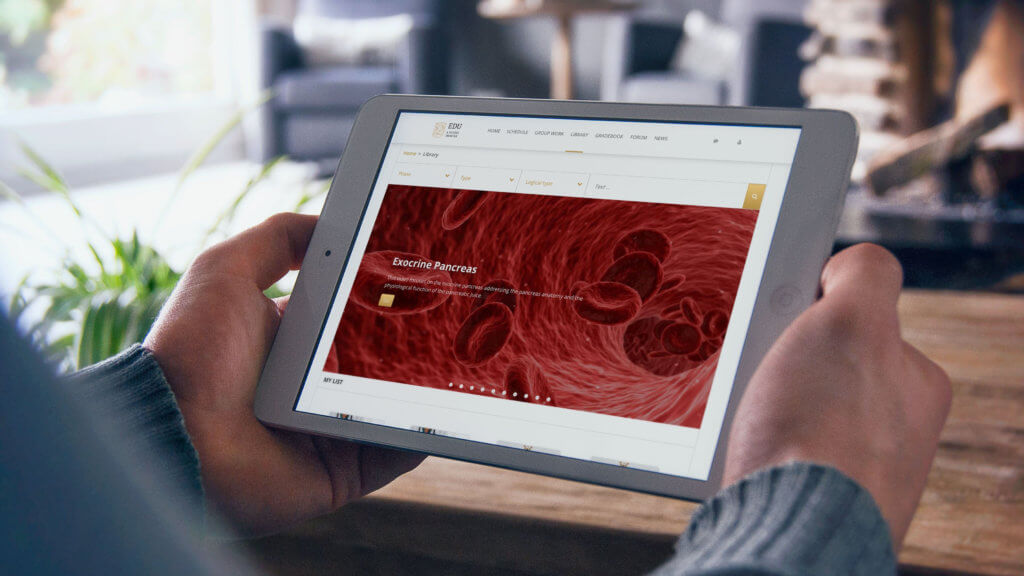Never again lecture hall - the first digital study of medicine in Germany
Judith Hillen
Sitting in lectures from Monday to Friday and listening to the lecturer is part of everyday life for medical students at German universities. However, the founders of EDU Medical School thought: There is another way. Since November 2018, they have been offering digital medical studies at their university with practical phases in clinics. Nils Thiessen, Medical Officer at EDU, after his own medical studies, looked for a way to redesign the course from scratch. His colleague Johannes Wöhler is responsible for the digital technologies on which EDU Medical School is based. In an interview with 5-HT, Nils and Johannes explain how studying at a digital university works and what opportunities it offers.
How does the digital study at EDU Medical School work?
Nils: The complete theoretical instruction takes place online with us. There is a learning platform where students have access to e-books, scientific articles, multimedia and interactive elements. There are also expert sessions, which are similar to seminars at the university, except that they take place in virtual classrooms. Via video transmission, students can see the lecturer and ask questions. Conversely, the lecturer can also see the students and respond to non-verbal signals. Small teams of four or five students can go into their own virtual classroom to solve problem-oriented patient cases together. In addition, students can also exchange information via chat functions and forums.
Johannes: Behind this is the collaborative learning approach. The idea is: learn online, but learn together. Our aim is to bring the high quality of interactions that you can have in a real classroom online and also to benefit from the advantages of digital learning.

What advantages does digital learning offer?
Johannes: You can learn where you want, and in many cases when you want. This is especially advantageous for students who live in remote areas and for various reasons cannot or do not want to move there. Only for the practical phases do they then have to spend a total of twelve weeks per year at one of the clinics with which we cooperate.
Nils: If you learn at home, you can create a much better working and learning atmosphere than in a lecture hall. Because of our digital methods, we can also develop our curriculum very flexibly. We have stored 4700 learning objectives for the entire course in a database. If we receive feedback from lecturers that a learning objective should be adjusted, we can check this in the curriculum development team and simply change it accordingly in the database - this is not something that has to be done for months by countless committees. Depending on where we offer the course, we can also adapt the content well to local needs. For example, suppose we go to Africa, then we can easily add topics like malaria to the curriculum.
How is the study program at EDU Medical College structured and what is the concept behind it?
Johannes: The study programme is organised in module blocks. For eight weeks you learn the theory on our digital platform, then there is an exam and then four weeks of practical training in a clinic. We are currently cooperating with Helios Kliniken GmbH in Germany for this purpose.
Nils: We integrate practical phases right from the start so that students can quickly transfer what they learn in theory into reality. We also focus on active learning: students must prepare in advance for the contents of the Expert Sessions according to the flip classroom principle. In class, knowledge is first tested with a quiz, followed by a discussion with the lecturer, and in problem-based teaching units, students work on concrete case studies in small groups. In other words, they learn to work on topics, communicate in a team and make their own diagnoses. In addition, we attach great importance to our students learning evidence-based medicine so that they will later be able to treat their patients in an evidence-based manner.
 Comfortable learning from any location - by means of modular content
Comfortable learning from any location - by means of modular contentWhat has disturbed you about the traditional structure of medical studies in Germany?
Nils: I myself studied medicine in Aachen. Sitting in lectures for four or five hours a day and only being passively present did not help me at all. This led to the fact that I only attended the compulsory courses and otherwise studied at home, with coffee, my books and my curriculum. I also missed the practical relevance at the university - it was only in the third year that we got to see the first real patient. I would also have liked to have had more lessons on evidence-based medicine. At university, you don't learn how to read scientific articles and how to distinguish the good from the bad. But as a doctor, you have to be able to do that in order to be able to decide quickly whether or not a therapy makes sense for a patient. At the end of the semester, all the exams came at once and three weeks later, 80 percent of the material had already been forgotten. These are all points that we did differently at EDU.
How was EDU founded?
Nils: During my studies I helped to develop the model course of studies in medicine in Aachen and implemented some innovations there. Some time later, my then boss, Professor Andreas Hoeft from the University Hospital Bonn, approached me because his son had started this model study course. Professor Hoeft asked me if I could imagine to redesign the medical studies from scratch. So I created the didactic concept for our medical school and took care of the accreditation, and Professor Hoeft used his network, among other things to find investors. EDU was finally founded in 2018, and in November last year, the first students started their Bachelor of Medicine studies with us.
Your university is accredited in Malta - why not in Germany?
Nils: We see ourselves as a European university. This is why we also teach in English - on the one hand, this is the language of science in medicine, and on the other hand, it offers our graduates better chances of working internationally later on. Malta was a good fit for us because the country received EU funding in 2009 to set up an accreditation body for innovative study programmes. I have the feeling that the openness for new ideas in German universities and authorities is not yet so great. They often lack the willingness to innovate and the willingness to take risks in taking new paths.
Our Bachelor's and Master's programmes are accredited by the National Commission of Further and Higher Education (NCFHE) in Malta according to EU Directive 2005/36. If our graduates wish to work in Germany after graduation, they can apply for a license to practice in the district government of a federal state.
What are your plans for the future of EDU and your Medical School?
Johannes: Our goal is to further increase the availability of medical studies. In the Healthcare sector, we want to expand our range of courses in the future, including further training courses for professionals. Above all, we want to make our studies available in other countries soon. In doing so, we have European, but also African countries in mind. The great advantage of a digital university is that no local infrastructure needs to be built for our studies. We only need a hospital that meets our quality requirements and that we can upgrade to a teaching hospital in order to offer our studies. Digitalisation also allows us to adapt the curriculum to local requirements. This enables us to guarantee the high quality of education even in the most remote regions of the world and to contribute to closing the large gap in doctors.
5-HT Chemistry & Health Newsletter
Want the latest tech and industry news, events, relevant info from the ecosystem and more?
Subscribe to 5-HT Newsletter now Subscribe to 5-HT Newsletter now
Become part of the 5-HT Chemistry & Health
Exchange ideas with innovative startups and future-oriented companies in our ecosystem. We look forward to meeting you!